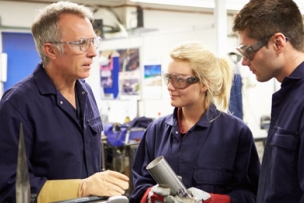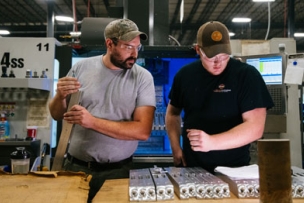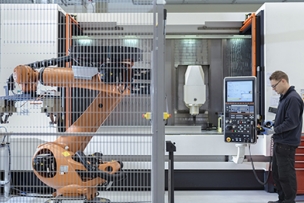Aerospace May Offer Opportunities to Industrial Metal-Cutting Companies
Experts consider aerospace to be one of the strongest industries. In one report from the Metal Service Center Institute, Richard Aboulafia, vice president of analysis at the Teal Group Corporation, said that aerospace was the only industry that saw growth acceleration through the recession and that the civil aviation sector in particular offers “major opportunities for long-term growth.”
This, of course, is good news for industrial metal-cutting companies serving this sector, and prospects continue to look good for the near future.
Set to Soar
According to a report from Defense News, the aerospace and defense industry set a new record for international sales in 2016, delivering $146 billion in exports. The article went on to say that 2017 could be “another banner year” for the defense and aerospace industries thanks to some anticipated government orders.
As reported by Defense News in December, the U.S. State Department approved in the first quarter of this fiscal year foreign military sales worth an estimated $45.2 billion dollars, which is said to be more than the total foreign military sales for all of fiscal 2016. “If approved by Congress and manufactured this year, some of those purchases could help rack up the export total for 2017,” the article states.
Deloitte’s 2017 Global Aerospace and Defense Sector Outlook is also optimistic. According to the Executive Summary, Deloitte expects industry revenues for the global aerospace and defense sector to resume growth, driven by higher defense spending. Following multiple years of positive but subdued rate of growth, Deloitte forecasts that sector revenues will likely grow by about 2.0 percent in 2017.
Forecasts from industry leader Boeing show similar trends. According to a January report from Reuters, Boeing expects to deliver between 760 and 765 commercial aircraft in 2017, topping 748 deliveries in 2016. Honeywell, on the other hand, forecasts a slight decline in 2017; however, the company expects deliveries will begin picking up in 2018 due to the strength of several new aircrafts entering service, AINonline reports.
This could spell opportunity for many industrial metal-cutting companies. As an article from IndustryWeek states, the aerospace industry is a good business in which to be competitive because the underlying drivers of demand are very strong. “Since the end of the Great Recession, new commercial aircraft orders have typically been double, and in some years, triple the number of annual deliveries,” the article states. “This reflects explosive growth of air traffic in the emerging world as rising incomes and declines in ticket fares make air travel affordable for increasing numbers of households.”
Equipped for Growth
As a critical part of the supply chain, there is no question that metal-cutting companies could reap the rewards of aerospace’s success. However, companies serving this sector need to be sure they are doing what it takes to win the business of both existing and potential aerospace customers, even if that means investing in advanced metal-cutting tools designed to meet the unique demands and shifting trends within the industry.
For example, as reported here by The Fabricator, Superior Machining & Fabrication has upgraded its 110,000-sq.-ft. machine shop to better serve the aerospace sector. “Changes include the addition of CAD/CAM software, a larger 5-axis bridge mill for hard metals, and a 5-axis SNK bridge mill,” the article states. “The company also has tripled the size of the quality room, added an assembly room, created a staffed tool/fixture room, introduced lean manufacturing/5S throughout the shop, and segmented the shop into cells with their own leaders/supervisors to help improve product flow.”
Shops should also be sure they are equipped to handle the material demands of customers, including the growing use of titanium in aerospace components. In a recent interview with American Metals Market, Rich Harshman of metals supplier Allegheny Technologies, Inc., says he sees a significant mix shift happening within the aerospace industry. Specifically, he says there is a “growing demand for our differentiated next-generation alloys as well as growing demand for our isothermal and hot-die forging and titanium investment castings.”
For metal-cutting operations, this means having a carbide-tipped band saw blade. Since titanium and other high-performance alloys are stronger and harder, they need more than the average bi-metal blade. Using a carbide-tipped band saw blade not only allows for the successful cutting of hard metals like titanium, it simultaneously offers longer blade life and faster cutting as well, according to the white paper, Characteristics of a Carbide-Friendly Bandsaw Machine.
Final Approach
In today’s unpredictable market, the truth is that no one really knows what the future holds for aerospace. However, industry leaders know that it pays to be prepared. Tailoring your operations and processes to meet the unique demands of the industries you serve will not only position you as a valued supply chain partner, but as an agile, industrial metal-cutting leader that is ready to fly when demand takes off.
- The aerospace industry is the only industry seeing growth acceleration during the recession and that the civil aviation sector offers major opportunities for long-term growth.
- Metal-cutting companies need to invest in advanced metal-cutting tools designed to meet the unique demands and shifting trends within the industry.
- While the market is unpredictable, industry leaders know that it pays to be prepared.
Previously featured on Blog.LenoxTools.com





Talk to Us!
Leave a reply
Your email address will not be published. Required fields are marked *